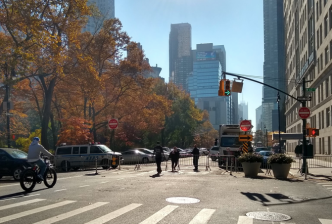When Will the Central Park Bike Blitz Be Over? “Ask the Mayor”
When NYPD announced that it was going to step up its bike enforcement at the beginning of the year, the best-case scenario went like this: Police would give out more tickets for risky, anti-social behavior like wrong-way biking, and the streets would seem a little more orderly as cycling continues its upward trajectory in NYC.

But the Wall Street Journal reported this week that a big hotspot in the bike crackdown isn’t “the streets” at all, really, but rather Central Park. NYPD has handed out ten times the number of bike tickets in the park this year compared to all of 2010. And the policy doesn’t seem to be singling out riders who are racing full tilt past pedestrians with the right of way. Cyclists whose only transgression is not sitting for the full red cycle at traffic lights in the park — even when the crossing is clear and car-free hours are in effect — are getting hit with $270 fines.
The ticket blitz has upended a longstanding social compact between cyclists, pedestrians, and cops in the park, which applied a common sense “yield to peds” rule during car-free hours. Now, with traffic-control devices designed for cars setting the enforcement agenda, riding in the park doesn’t seem so relaxing or recreational.
Why the sudden change? Randy Cohen, author of the Ethicist column in the Times (and star of a few Streetfilms), reports on an enlightening conversation he recently had with a Central Park police officer:
I just returned from riding in the (blissfully warm, if swampy) park, where I had an amiable chat with a police officer who couldn’t have been friendlier. When I asked about the current bikes and lights policy, he smiled ruefully — with what I took to be professional embarrassment — and said that the policy is to enforce the traffic laws. When I asked if the long established practice — during car free hours, yield to pedestrians who have the light, but if there are none, roll one — wasn’t better, he agreed that, in his words “there’s a difference between law and common sense.” I asked when, if ever, things would return to how they’d been for the past thirty years, he smiled and said: “You’ll have to ask the mayor next time you see him.” Again, this officer was entirely reasonable and courteous. But there you have it, the further impression that the mayor created this situation and only he can change it.

